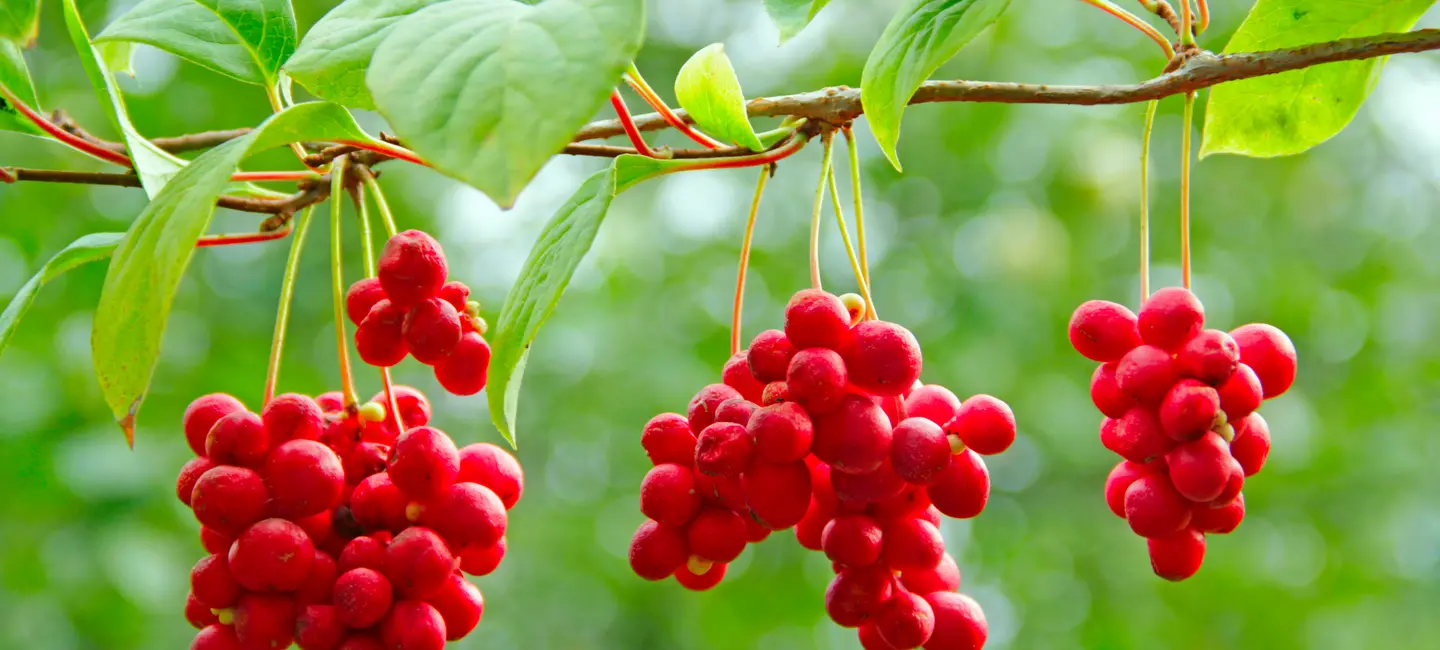
Schisandra (Schisandra chinensis) is a plant native to northern China. The fruit is eaten as food and also used to make medicine.
Schisandra is considered an adaptogen. Adaptogens are a class of natural substances that are believed to stimulate the body's resistance to physical, environmental, and emotional stressors. The chemicals in schisandra also improve liver function and might increase energy, which can improve endurance and coordination.
People use schisandra for menopause, exercise performance, pneumonia, and many other purposes, but there is no good scientific evidence to support any use.
Is It Effective?
There is interest in using schisandra for a number of purposes, but there isn't enough reliable information to say whether it might be helpful.
Is it Safe?
When taken by mouth: Schisandra is possibly safe when taken appropriately. It's been used safely for up to 12 weeks. It can cause heartburn, upset stomach, decreased appetite, and itching.
Special Precautions & Warnings:
Pregnancy: Schisandra is possibly unsafe when taken by mouth during pregnancy. It might cause the uterus to contract, which might lead to miscarriage. Do not use schisandra during pregnancy.
Breast-feeding: There isn't enough reliable information to know if schisandra is safe to use when breast-feeding. Stay on the safe side and avoid use.
Cyclophosphamide
Interaction Rating=Moderate Be cautious with this combination.
Schisandra might decrease how quickly the body breaks down cyclophosphamide. Taking schisandra with cyclophosphamide might increase the effects and side effects of cyclophosphamide.
Cyclosporine (Neoral, Sandimmune)
Interaction Rating=Moderate Be cautious with this combination.
Schisandra might decrease how quickly the body breaks down cyclosporine. Taking schisandra with cyclosporine might increase the effects and side effects of cyclosporine.
Medications changed by the liver (Cytochrome P450 2C19 (CYP2C19) substrates)
Interaction Rating=Moderate Be cautious with this combination.
Some medications are changed and broken down by the liver. Schisandra might change how quickly the liver breaks down these medications. This could change the effects and side effects of these medications.
Medications changed by the liver (Cytochrome P450 2C9 (CYP2C9) substrates)
Interaction Rating=Moderate Be cautious with this combination.
Some medications are changed and broken down by the liver. Schisandra might change how quickly the liver breaks down these medications. This could change the effects and side effects of these medications.
Medications changed by the liver (Cytochrome P450 3A4 (CYP3A4) substrates)
Interaction Rating=Moderate Be cautious with this combination.
Some medications are changed and broken down by the liver. Schisandra might change how quickly the liver breaks down these medications. This could change the effects and side effects of these medications.
Medications moved by pumps in cells (P-glycoprotein substrates)
Interaction Rating=Moderate Be cautious with this combination.
Some medications are moved in and out of cells by pumps. Schisandra might change how these pumps work and change how much medication stays in the body. In some cases, this might change the effects and side effects of a medication.
Midazolam
Interaction Rating=Moderate Be cautious with this combination.
Schisandra might decrease how quickly the body breaks down midazolam. Taking schisandra along with midazolam might increase the effects and side effects of midazolam.
Sirolimus (Rapamune)
Interaction Rating=Moderate Be cautious with this combination.
Schisandra might decrease how quickly the body breaks down sirolimus. Taking schisandra along with sirolimus might increase the effects and side effects of sirolimus. Talk with your healthcare provider if you are taking sirolimus.
Tacrolimus (Prograf)
Interaction Rating=Moderate Be cautious with this combination.
Schisandra might decrease how quickly the body breaks down tacrolimus. Taking schisandra with tacrolimus might increase the effects and side effects of tacrolimus. Talk with your healthcare provider before using this combination.
Talinolol
Interaction Rating=Moderate Be cautious with this combination.
Schisandra might increase the amount of talinolol in the body. Taking schisandra while taking talinolol might increase the effects and side effects of talinolol.
Voriconazole (Vfend)
Interaction Rating=Moderate Be cautious with this combination.
Schisandra might decrease how quickly the body breaks down voriconazole. Taking schisandra with voriconazole might increase the effects and side effects of voriconazole.
Warfarin (Coumadin)
Interaction Rating=Moderate Be cautious with this combination.
Warfarin is used to slow blood clotting. Schisandra might increase the breakdown and decrease the effects of warfarin. Decreasing the effects of warfarin might increase the risk of clotting. Be sure to have your blood checked regularly. The dose of your warfarin might need to be changed.
There are no known interactions with herbs and supplements.
There are no known interactions with foods.
There isn't enough reliable information to know what an appropriate dose of schisandra might be. Keep in mind that natural products are not always necessarily safe and dosages can be important. Be sure to follow relevant directions on product labels and consult a healthcare professional before using.
Bac Ngu Vi Tu, Baie de Schisandra, Beiwuweizi, Bei Wu Wei Zi, Chinese Mongolavine, Chinese Schizandra, Chinesischer Limonenbaum, Chosen-Gomischi, Five-Flavor-Fruit, Five-Flavor-Seed, Fructus Schisandrae, Fructus Schisandrae Chinensis, Fruit aux Cinq Saveurs, Gomishi, Hoku-Gomishi, Kadsura chinensis, Kita-Gomishi, Limonnik Kitajskij, Mei Gee, Magnolia Vine, Matsbouza, Nanwuweizi, Ngu Mei Gee, Northern Schisandra, Omicha, Schisandra Berry, Schisandra chinensis, Schisandra chinensis var. rubriflora, Schisandra Sinensis, Schisandra sphaerandra, Schisandra sphenanthera, Schisandrae, Schizandra, Schizandra Chinensis, Schizandre Fructus, Schzandra, Southern Schisandra, Wuhzi, Wuweizi, Wu-Wei-Zi, Western Schisandra, Xiwuweizi.
Information on this website is for informational use only and is not intended to replace professional medical advice, diagnosis, or treatment. While evidence-based, it is not guaranteed to be error-free and is not intended to meet any particular user’s needs or requirements or to cover all possible uses, safety concerns, interactions, outcomes, or adverse effects. Always check with your doctor or other medical professional before making healthcare decisions (including taking any medication) and do not delay or disregard seeking medical advice or treatment based on any information displayed on this website.
© TRC Healthcare 2024. All rights reserved. Use and/or distribution is permitted only pursuant to a valid license or other permission from TRC Healthcare.
